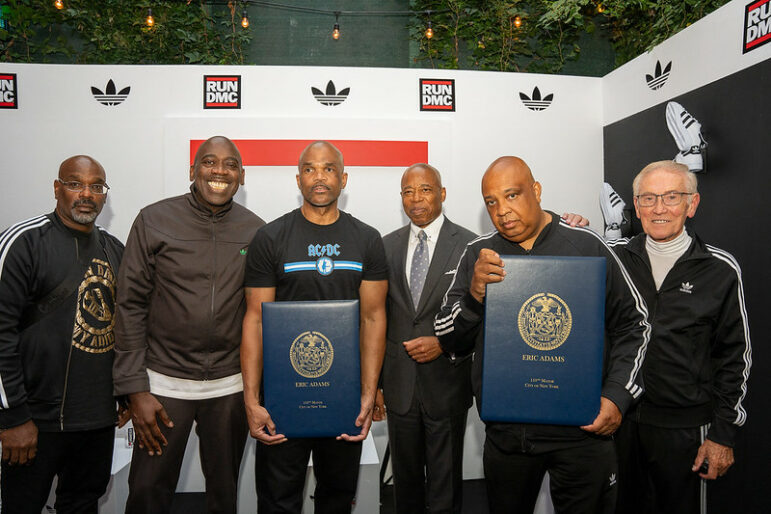“The Bronx may have birthed hip-hop, but Queens embraced it with open arms and nurtured its growth. As the phenomenon spread through New York City, Queens quickly established itself as a hotbed for talent, nurturing the creativity of aspiring artists who would later become legends.”

Benny Polatseck/Mayoral Photography Office
Run-DMC, one of the early hip-hop groups to emerge in Queens, being honored by Mayor Eric Adams earlier this month.A cultural revolution was born five decades ago. Hip-hop, an electrifying musical genre and cultural movement, emerged onto the streets of New York, forever transforming the global music landscape. As we celebrate its 50th anniversary, it is essential to pay homage to the rich history of hip-hop, its cultural significance, and its profound impact on society.
The roots of hip-hop can be traced back to the 1970s when innovative DJs like DJ Kool Herc began experimenting with turntables and breakbeats at block parties in the South Bronx. These pioneering moments laid the groundwork for what would become a powerful movement.
The Bronx may have birthed hip-hop, but Queens embraced it with open arms and nurtured its growth. As the phenomenon spread through New York City, Queens quickly established itself as a hotbed for talent, nurturing the creativity of aspiring artists who would later become legends.
One of the earliest hip-hop groups to emerge from Queens was Run-DMC, whose impact on the genre cannot be overstated. With hits like “It’s Like That” and “My Adidas,” Run-DMC brought hip-hop into the mainstream and forever changed the music industry. Their fusion of street style and confident delivery made them cultural icons and paved the way for other Queens-based artists.
Queens continued to produce some of hip-hop’s most influential artists, such as Nas, LL Cool J, and A Tribe Called Quest. Nas, with his poetic storytelling on “Illmatic,” earned critical acclaim and is often regarded as one of the greatest hip-hop albums of all time. LL Cool J, on the other hand, popularized the fusion of rap and R&B, becoming the first hip-hop artist to achieve commercial success in both genres. LL Cool J’s raw lyrical talent and charismatic persona earned him the title “King of Rock,” making him one of the first solo hip-hop artists to achieve mainstream success. A Tribe Called Quest brought jazz-infused beats and thought-provoking lyrics to the forefront, demonstrating the artistic depth and versatility of hip-hop.
Hip-hop has always been more than just music; it’s a powerful tool for social change and self-expression. Queens artists have often used their platforms to address issues such as racial inequality, poverty, and systemic injustice. Public Enemy, led by Chuck D, delivered politically charged messages through tracks like “Fight the Power,” rallying against racial oppression and inspiring generations to stand up for their rights.
Honoring hip-hop’s 50th anniversary in Queens is not only a celebration of musical achievement but also a recognition of its enduring cultural significance. As co-chair of the Queens delegation of the NYC Council, it is my privilege to shine this spotlight on the contributions of my borough to the genre of hip-hop. The genre has transcended borders and language barriers, influencing fashion, language, dance, and even political activism worldwide.
As we celebrate the legacy of hip-hop, and remember the contributions of Queens, it’s crucial to acknowledge the challenges it has faced throughout its journey. Hip-hop has been criticized for promoting violence, misogyny, and materialism. However, it’s essential to remember that the genre is multifaceted, with artists who use their lyrics to reflect their experiences and realities. Many hip-hop artists from Queens and beyond have been champions for positive change, advocating for education, peace, and community empowerment.
As we commemorate this milestone, let us remember the pioneers who paved the way, the artists who brought the genre to new heights, and the communities that supported and nurtured hip-hop’s growth. In September, I hope the NYC Council will approve two resolutions I authored recognizing August as the Hip-Hop Recognition Month and December as Hip-Hop History Month, and a second resolution recognizing Def Jam for their contributions to the genre.
Let us honor the creativity, passion, and authenticity that define the spirit of hip-hop in New York City and beyond. By doing so, we ensure that the legacy of hip-hop will continue to inspire and uplift generations to come. Happy 50th Anniversary, hip-hop in Queens.
New York City Council Member Nantasha Williams is the representative for Council District 27 in Southeast Queens.








